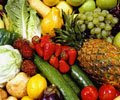Free Radicals are present in our food, air and environment; they enter our bodies every day. Free radicals are compounds that attack cells by removing an electron in order to become atomically balanced. By removing electrons from healthy compounds, free radicals inflict damage—often known as oxidation—which is irreversible.
Antioxidants are substances or nutrients in our foods which can prevent or slow the oxidative damage to our body. Antioxidants act as "free radical scavengers" and in return prevent and repair damage done by these free radicals by replacing cells with their missing electrons. Health problems such as heart disease, diabetes, cancer etc. are all contributed by oxidative damage. Studies have found that 5 servings of fruits and vegetables (which are excellent sources of antioxidants) reduce the risk of stroke by 25 percent. Antioxidants may also improve your immune system and therefore lower the risk of cancer and other infections.
Many vitamins and minerals act as antioxidants in their own right, such as vitamin C, vitamin E, beta carotene, lutein, lycopene, vitamin B2, coenzyme Q10, and cysteine (an amino acid). Herbs, such as bilberry, turmeric, (curcumin), grape seed or pine bark extracts, and ginkgo can also provide powerful antioxidant protection for the body.
I like to think of antioxidants as the "Fountain of Youth" as they also help with the aging process.
Consuming a wide variety of antioxidant enzymes, vitamins, minerals, and herbs may be the best way to provide the body with the most complete protection against free radical damage.



No comments:
Post a Comment